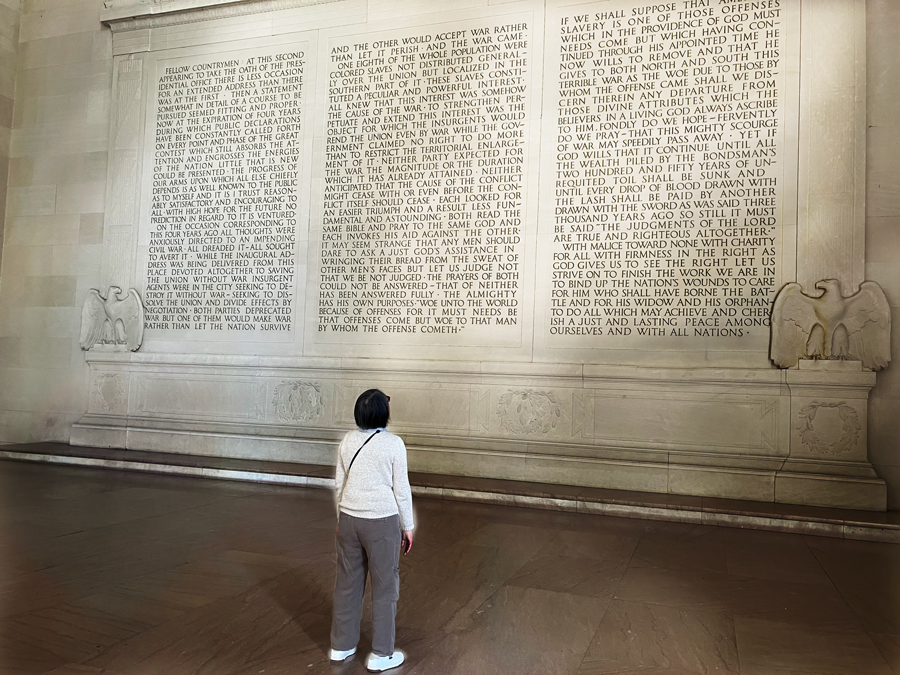At the Lincoln Memorial Lincoln’s words were etched in stone so they couldn’t be erased from history by an executive order.
Lincoln’s words were etched in stone so they couldn’t be erased from history by an executive order.
Lincoln used just 701 words to lament the death and destruction war had wrought on a young nation. The sheer beauty of those words makes his message all the more searing.
The conflict claimed some 600,000 lives, equivalent to six million Americans in today’s population.
Lincoln spoke to the crowd gathered for his second inauguration:
“…the Almighty has his own purpose.”
“…he gives to both North and South this terrible war, as the woe due to those by whom the offense came…”
“…both read the same Bible, and pray to the same God; and each invokes his aid against the other.”
“…it may seem strange that any men should dare to ask a just God’s assistance in wringing their bread from the sweat of other men’s faces; but let us judge not, that we be not judged.”
Today, not far from the Lincoln Memorial sits the National Museum of African American History and Culture. It has come under full attack by recent executive order.
Donald Trump condemns it as part of a “widespread effort to rewrite our nation’s history” that promotes a divisive, race-centered ideology.
He downplays the role slave labor played in building our nation. He claims that classroom discussions of Jim Crow laws, segregated public facilities and racial violence does harm to our children.
Lincoln’s words, first delivered 150 years ago, were carved into stone as a warning that even people who read the Bible and pray to God can fall into the darkness.
The full text of Lincoln’s brief Second Inaugural Address follows.
Fellow-countrymen: At this second appearing to take the oath of the presidential office, there is less occasion for an extended address than there was at the first. Then a statement, somewhat in detail, of a course to be pursued, seemed fitting and proper. Now, at the expiration of four years, during which public declarations have been constantly called forth on every point and phase of the great contest which still absorbs the attention and engrosses the energies of the nation, little that is new could be presented. The progress of our arms, upon which all else chiefly depends, is as well known to the public as to myself; and it is, I trust, reasonably satisfactory and encouraging to all. With high hope for the future, no prediction in regard to it is ventured.
On the occasion corresponding to this four years ago, all thoughts were anxiously directed to an impending civil war. All dreaded it—all sought to avert it. While the inaugural address was being delivered from this place, devoted altogether to saving the Union without war, insurgent agents were in the city seeking to destroy it without war—seeking to dissolve the Union, and divide effects, by negotiation. Both parties deprecated war; but one of them would make war rather than let the nation survive; and the other would accept war rather than let it perish. And the war came.
One-eighth of the whole population were colored slaves, not distributed generally over the Union, but localized in the Southern part of it. These slaves constituted a peculiar and powerful interest. All knew that this interest was, somehow, the cause of the war. To strengthen, perpetuate, and extend this interest was the object for which the insurgents would rend the Union, even by war; while the government claimed no right to do more than to restrict the territorial enlargement of it.
Neither party expected for the war the magnitude or the duration which it has already attained. Neither anticipated that the cause of the conflict might cease with, or even before, the conflict itself should cease. Each looked for an easier triumph, and a result less fundamental and astounding. Both read the same Bible, and pray to the same God; and each invokes his aid against the other. It may seem strange that any men should dare to ask a just God’s assistance in wringing their bread from the sweat of other men’s faces; but let us judge not, that we be not judged. The prayers of both could not be answered—that of neither has been answered fully.
The Almighty has his own purposes. “Woe unto the world because of offenses! for it must needs be that offenses come; but woe to that man by whom the offense cometh.” If we shall suppose that American slavery is one of those offenses which, in the providence of God, must needs come, but which, having continued through his appointed time, he now wills to remove, and that he gives to both North and South this terrible war, as the woe due to those by whom the offense came, shall we discern therein any departure from those divine attributes which the believers in a living God always ascribe to him? Fondly do we hope—fervently do we pray—that this mighty scourge of war may speedily pass away. Yet, if God wills that it continue until all the wealth piled by the bondman’s two hundred and fifty years of unrequited toil shall be sunk, and until every drop of blood drawn with the lash shall be paid by another drawn with the sword, as was said three thousand years ago, so still it must be said, “The judgments of the Lord are true and righteous altogether.”
With malice toward none; with charity for all; with firmness in the right, as God gives us to see the right, let us strive on to finish the work we are in; to bind up the nation’s wounds; to care for him who shall have borne the battle, and for his widow, and his orphan—to do all which may achieve and cherish a just and lasting peace among ourselves, and with all nations.![]()

Lowell Thompson
These are the most honest and morally brave words any American president ever said, “Yet, if God wills that it continue until all the wealth piled by the bondman’s two hundred and fifty years of unrequited toil shall be sunk, and until every drop of blood drawn with the lash shall be paid by another drawn with the sword, as was said three thousand years ago, so still it must be said, “The judgments of the Lord are true and righteous altogether.”
Edna Grad
I assume this very-timely observation is your very own , and I applaud you for it.
Pat Shiplett
It’s my writing. The nice thing about ‘Out Among Humans’ is that it gives me a chance to think out loud and share with friends like you.
Lincoln’s language is a mix of Shakespeare, the King James Bible and 19th century rhetoric. It is a work I read frequently to remind myself of … (not sure what word to use)
Lynn Crosswaite
I never read the wall at the Lincoln Memorial. I was never even in D.C. until recently! The African American Museum is wonderful, I spent the better part of a day there. Disgusting that Trump is trying to erase black history. They are evil.
Pat Shiplett
Lynn, I think “evil” is the right word to use.
The Lincoln Memorial is hallowed ground to me. To think that our country brought upon itself such a disaster.
Bev Bolson
Thank you for sharing this, Pat. I’ve never read Lincoln’s second inaugural address before.
Bev
Pat Shiplett
What an unenviable task Lincoln had to make sense of the carnage caused be the industry even southern slave owners knew to be evil.
Echos of Shakespeare and the King James Bible.
Harold Schlegel
I’ve reluctantly come to the conclusion that the Trump gang are motivated too much by the enjoyment of cruelty. Telling them that the are causing damage is like telling Yevgeny Prigozhin that people are afraid of him because of his rumored use of a sledgehammer. Hearing about the Trump gang’s exploit makes me think about other famous criminal gangs who discover too late some detail they should have paid more attention to or some rival gang whose strength was greater than they thought. There’s always something that can go wrong and no person, group, algorithm, computer etc. can anticipate all the things that can go wrong. Failure is inevitable but sometimes it takes too long to happen. The gang’s cruelty is their power and I hope their undoing. Leaders in the democratic world (to which our official government no longer belongs) are moving to protect themselves from us and leaders of the undemocratic world are moving into position to benefit from the breakdown of the American political system.
Pat Shiplett
Harold, thank you for this wise and eloquent description of the situation we find ourselves in.
Jenny
I’d like to believe that “it must needs be that offenses come” isn’t true, but it appears that it is. Pat, thanks for the reminder of the poetry of Lincoln’s words.
Pat Shiplett
Couldn’t agree with your more, Jenny. Lincoln must have struggled even more with his well-documented depression because of war.
Neil Shapiro
Pat, this may be my first time replying to you about your excellent posts. Thanks so much for reminding us of the singular eloquence & empathy of our 16th president. I don’t know if you’ve read This Republic of Suffering by Drew Gilpin Faust, but I highly recommend it. It’s a compelling study of the true toll of the death & destruction wrought by the Civil War. Not exactly a day at the beach, but then again neither is the nightmare that this country finds itself in today. Thanks again for your observations.
Pat Shiplett
Thanks, Neil. Gilpin Faust’s book is new to me. I’ll be sure to check it out. I hope we don’t stumble into another war. We have such short memories and like to hide our mistakes.
Pat Shiplett
Here’s the link to “This Republic of Suffering.” https://www.goodreads.com/book/show/1283566.This_Republic_of_Suffering
Thanks again Neil.